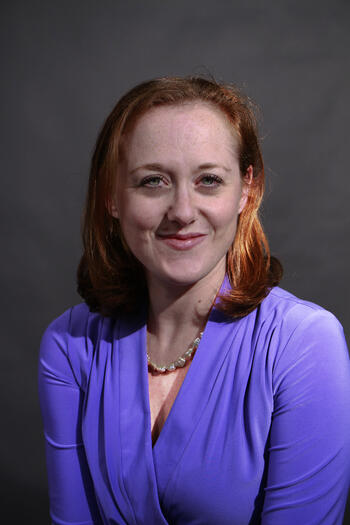In the years since World War II, as the global geopolitical map was drawn and redrawn along ideological lines, the world witnessed ascension of many authoritarians. They often ruled for long stretches, but eventually most faced a political reckoning. The people they governed no longer accepted their authority and demanded change.
The fate of authoritarians in the aftermath of such crises is the subject of a new
study in the journal
Party Politics written by Stanford political scientist Anna Grzymala-Busse
. At such inflection points, she says, authoritarians face a [[{"fid":"229407","view_mode":"crop_870xauto","fields":{"format":"crop_870xauto","field_file_image_description[und][0][value]":"Photograph of Anna Grzymala-Busse.","field_file_image_alt_text[und][0][value]":"Photograph of Anna Grzymala-Busse.","field_file_image_title_text[und][0][value]":"Photograph of Anna Grzymala-Busse.","field_credit[und][0][value]":"","field_caption[und][0][value]":"","thumbnails":"crop_870xauto","alt":"Photograph of Anna Grzymala-Busse.","title":"Photograph of Anna Grzymala-Busse."},"type":"media","field_deltas":{"1":{"format":"crop_870xauto","field_file_image_description[und][0][value]":"Photograph of Anna Grzymala-Busse.","field_file_image_alt_text[und][0][value]":"Photograph of Anna Grzymala-Busse.","field_file_image_title_text[und][0][value]":"Photograph of Anna Grzymala-Busse.","field_credit[und][0][value]":"","field_caption[und][0][value]":"","thumbnails":"crop_870xauto","alt":"Photograph of Anna Grzymala-Busse.","title":"Photograph of Anna Grzymala-Busse."}},"link_text":null,"attributes":{"alt":"Photograph of Anna Grzymala-Busse.","title":"Photograph of Anna Grzymala-Busse.","style":"float: right; height: 350px; width: 200px; margin-top: 10px; margin-left: 15px; margin-bottom: 10px;","class":"media-element file-crop-870xauto","data-delta":"1"}}]]choice:theycan cling to power, albeit by ceding a certain degree of control, or they can exit governing altogether, either by dissolving the party entirely or, more dramatically, by reinventing themselves as democrats.
Newly minted democrats
It was these reinventors – the newly minted democrats – that intrigued Grzymala-Busse the most. She found that while many enjoyed initial electoral success, most ended up losing power in the long run.
“Paradoxically,” Grzymala-Busse said, “this fate seems to flow precisely from the decision to reinvent their organizations, their political symbols and their state programs to fit the norms of free political competition.”
In adopting democratic rhetoric and standards of competence, it seems, the parties find initial success, but then are unable to sustain newfound democratic philosophies and programs. They hoist themselves on their own petards, as she put it in her paper, alluding to Shakespeare’s Hamlet.
These reinvented parties often attract new politicians who are more entrepreneurial than their predecessors. Those new faces, however, often prove to be mere opportunists. The resulting scandals destroy party credibility and contribute to an unending downward political spiral.
Ironically, Grzymala-Busse found that the best choice for authoritarians is simply to cling to power “counting on a loyal if unhappy electorate,” even if it means ceding much of their once-monopolistic grip on power to democratic reforms.
81 governments studied
For her study, Grzymala-Busse examined and quantified the resulting political denouements of 81 authoritarian governments spanning the period from 1945 to 2015. Countries studied include the former Soviet Bloc, China, Cuba, several in Southeast Asia, many African nations and Mexico. The governing systems ranged from the communism of the Soviet Bloc and socialism to secular state-building and rule for the sake of national security.
The success of the reinventors can be rapid and remarkable, but so too can be the demise. Grzymala-Busse noted that the Hungarian Socialist Party won 43 percent of the vote and 49 percent of the seats in 2006, only to succumb to allegations of deception, mismanagement and fraud soon afterward. In Poland, the Democratic and Left Alliance (SLD), which won 41 percent of the vote in 2001, watched as its power steeply declined in the subsequent decade until the party dissolved entirely in 2011.
“Those who reinvented shone more brightly for a brief time, but burned out. Those who chose orthodoxy never enjoyed the great success of the reinventors, but they survived,” she said.
And what of those authoritarians who choose neither to remain nor to reinvent? Grzymala said that they simply dissolve back into society where former members often capitalize on their connections to become captains of industry.
“Some become oligarchs,” she said, “retaining power by other means.”
Lessons on change
The takeaway of her study for at-risk authoritarians, Grzymala-Busse said, is that reinvention alone is not enough to carry the party. New parties cannot survive as the remnants of their former selves. They must become entirely new organizations with viable programmatic approaches. Likewise, she said, when newly minted democrats hail competence as a competitive advantage, they must make good on the promise. If they fall short, they face exceptionally harsh outcomes at the polls.
“The irony is, without real change, the parties that built democracy by supporting free elections fall victim to those same democratic forces they championed.”
Anna Grzymala-Busse is the Kevin and Michelle Douglas Professor of International Studies and a senior fellow at the Freeman Spogli Institute for International Studies at Stanford University.
The study was made possible by financial support from the Carnegie Foundation.




